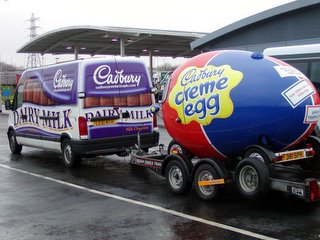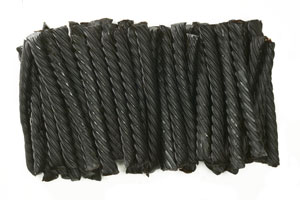
As candy goes, I love the buttercreamy fondant center of Creme Eggs, and could live without the taste of licorice in my candy. As stocks go, figuring out whether or not I want to invest in the makers of these confections is more complicated than taste.
Jim Cramer started me down the winding Candy Land path of this post. From the 11/22/05 recap of Mad Money:
Beverage and confectionery company, Cadbury Schweppes (CSG:NYSE - news - research - Cramer's Take), announced Monday that it would sell its European beverage business, and analysts applauded, said Cramer.
He believes that Cadbury can take a hint and will sell its American beverage business, which includes Dr. Pepper, 7 Up, and Schweppes.
Cramer said candy is growing faster than soft drinks, and Cadbury's P/E multiple is being held down because of the beverage business. Cadbury trades at about 16 times earnings, said Cramer, while pure-play candy companies such as Hershey (HSY:NYSE - news - research - Cramer's Take) and William Wrigley Jr. (WWY:NYSE - news - research - Cramer's Take) sell at 23 and 28 times, respectively.
Cramer's enticing thesis is that investors will profit if Cadbury spins off its soda business and focuses on making Creme Eggs, Caramellos, and other gooey chocolate confections. Wall Street rewards growth, and would reward CSG for sloughing off its slower growth soda business. His "addiction by subtraction" thesis reminded me of my recent Greenblatt readings about spinoffs. I like this kind of counterintuitive thinking.
Taking Cramer's numbers and fleshing them out, CSG is trading at around $39 a share, with earnings per share of around $2.45, giving an approximate P/E ratio of 16. Doing some very simple arithmetic manipulation, if CSG's P/E ratio were to rise to between 23 and 28, where HSY and WWY trade, shares of CSG would trade at between $56 and $68, an increase of 44% to 74%. This is a lucrative thesis, indeed. But a thesis riding on a huge contingency:
Cadbury's multiple is sure to expand, if it sells off its American beverage business, he said.
Management has been coy about its plans, though, said Cramer. So, if it becomes apparent Cadbury isn't going to sell, the investment thesis is void, and you should get out the stock.
CSG is not such an attractive stock to own in its current form. Looking at numbers from SmartMoney.com, CSG has a PEG of 2.26. The stock has appreciated 11% in the last year and 60% over the last three, leaving CSG's current share price a bit rich when you look at its competitors in the soft drink industry. Coke (KO) and Pepsi (PEP) both have lower PEGs (2.09 and 2.02, respectively).

Among CSG's confectioners competitors is the second stock for today, an obscure producer of licorice flavorings that grabbed my attention with impressive 5-year earnings growth and net profit margin numbers, M & F Worldwide (MFW).
Here is the company's website, a simple affair that explains the diverse array of industries and products that utilize licorice flavoring. MFW even proclaims itself "The World Leader in Quality Licorice Products Since 1850" from the very, um, humble locale of Camden, New Jersey.

MFW has a profitable niche to itself. Forget commodities like precious metals and oil, MFW is minting money out of licorice root. Here are some more attractive numbers from Morningstar:
Free cash flow has been fairly steady, and impressive for a company with a market cap of $325M:
'96: 8.0M; '97: 23.0M; '98: 30.2M; '99: 26.9M; '00: 29.5M; '01: 65.3M; '02: 36.5M; '03: 33.4M; '04: 22.2M; TTM: 30.1M
MFW has a low Price/Cash Flow ratio (10.3) compared to other stocks in its industry (12.0) and the S&P 500 (14.4). Morningstar says that this low ratio can signify a good value if the cash flows are sustainable or can grow. Using the FCF history of MFW as a guide, cash flow looks solidly dependable.
MFW is about 40% above its 52-week low, and just 5% off its 52-week high. The Short Interest is 11.7, meaning there are a lot of shorted shares of MFW. SmartMoney says that "A short interest ratio of greater than 2.0 is often considered a sign that a stock's price will soon go higher. The rationale is that the large short position must be covered in the future, thereby creating buying pressure and driving the stock price up."
But not all of the numbers are cotton candy and lollipops. Earnings are down slightly from last year:
Basic earnings per common share were $0.32 in the 2005 quarter and $0.34 per common share in the 2004 quarter.
No earnings growth, no PEG.
There's also this odd bit of company diversification reported in the November 9 press release:
On October 31, 2005, the Company announced that it entered into a Stock Purchase Agreement, dated as of October 31, 2005, with Honeywell International, Inc., pursuant to which the Company will acquire all of the issued and outstanding shares of Novar USA Inc. for a purchase price of $800 million. Novar USA, Inc. is the parent company of the businesses operated by Clarke American and related companies, including Alcott Routon, Checks in the Mail and B2Direct. Clarke American provides check-related products and extensive servicing to financial institution customers. Alcott Routon provides direct marketing programs based on analytics and predictive modeling to help financial institutions target customers. Checks in the Mail supplies checks and other financial documents directly to consumers, and B2Direct offers customized business kits and treasury management services to businesses.
The company acquired an unrelated check printing business with their piles of ducats. The synergistic possibilities here elude me.
So we have some negatives to contend with:
1. Negative earnings growth;
2. Licorice business tied to the tobacco business which may be growing abroad, but is stalled here; and
3. Paying bills online should be hurting the check printing firms, right?
Candy is a sweet and tasty treat. It also can make you hyperactive. Candy can put a smile on your face, or contribute to unsightly tooth decay. Not to mention a flabby middle. I'm really stretching this metaphor, but these pros and cons, risks and rewards, are reflected in CSG and MFW. These stocks have been sweet to their investors, but is the flavor about to run out?


No comments:
Post a Comment